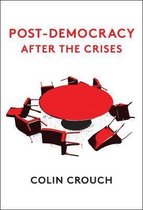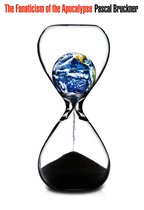Buying Time The Delayed Crisis of Democratic Capitalism
Afbeeldingen
Sla de afbeeldingen overArtikel vergelijken
- Engels
- Paperback
- 9781786630711
- 07 februari 2017
- 222 pagina's
Wolfgang Streeck
(Bron: Wikipedia. Beschikbaar onder de licentie Creative Commons Naamsvermelding/Gelijk delen.)"
Samenvatting
The financial and economic crisis that began in 2008 still has the world on tenterhooks. The gravity of the situation is matched by a general paucity of understanding about what is happening and how it started.
In this book, based on his 2012 Adorno Lectures given in Frankfurt, Wolfgang Streeck places the crisis in the context of the long neoliberal transformation of postwar capitalism that began in the 1970s. He analyses the subsequent tensions and conflicts involving states, governments, voters and capitalist interests, as expressed in inflation, public debt, and rising private indebtedness. Streeck traces the transformation of the tax state into a debt state, and from there into the consolidation state of today. At the centre of the analysis is the changing relationship between capitalism and democracy, in Europe and elsewhere, and the advancing immunization of the former against the latter.
In this new edition, Streeck has added a substantial postface on the reception of the book and the unfolding of the crisis in the Eurozone since 2014.
Productspecificaties
Inhoud
- Taal
- en
- Bindwijze
- Paperback
- Oorspronkelijke releasedatum
- 07 februari 2017
- Aantal pagina's
- 222
- Illustraties
- Nee
Betrokkenen
- Hoofdauteur
- Wolfgang Streeck
- Hoofduitgeverij
- Verso Books
Vertaling
- Eerste Vertaler
- David Fernbach, Patrick Camiller
- Originele titel
- Gekaufte Zeit (Berlin, 2013)
Overige kenmerken
- Editie
- 2
- Extra groot lettertype
- Nee
- Product breedte
- 129 mm
- Product hoogte
- 15 mm
- Product lengte
- 198 mm
- Studieboek
- Ja
- Verpakking breedte
- 126 mm
- Verpakking hoogte
- 23 mm
- Verpakking lengte
- 195 mm
- Verpakkingsgewicht
- 470 g
EAN
- EAN
- 9781786630711
Je vindt dit artikel in
- Categorieën
- Beschikbaarheid
- Leverbaar
- Taal
- Engels
- Boek, ebook of luisterboek?
- Boek
- Studieboek of algemeen
- Algemene boeken
Reviews
Negatief, positief, neutraal: we zetten een review altijd online. We controleren wel eerst of ’ie voldoet aan onze reviewvoorwaarden en niet nep is. We controleren ook of ’ie is geschreven door iemand die het artikel heeft gekocht via bol.com en zetten dit er dan bij. De controles gebeuren automatisch, al kijken er soms mensen mee. Bol.com betaalt niet voor reviews. Als een reviewer door een andere partij is vergoed, staat dit in de review zelf.
Negatief, positief, neutraal: we zetten een review altijd online. We controleren wel eerst of ’ie voldoet aan onze reviewvoorwaarden en niet nep is. We controleren ook of ’ie is geschreven door iemand die het artikel heeft gekocht via bol.com en zetten dit er dan bij. De controles gebeuren automatisch, al kijken er soms mensen mee. Bol.com betaalt niet voor reviews. Als een reviewer door een andere partij is vergoed, staat dit in de review zelf.
-
Uitstekend boek!Toon alleen de eerste 3 punten
Positieve punten
- Toegankelijk
- Compleet
- Inspirerend
- Verrassend
- Verrassend
Geschreven bij Buying Time The Delayed Crisis Of Democ
Het boek is begin april ook in Nederlandse vertaling beschikbaar. Goede zaak, want zelfs al ken je goed Engels (of Duits voor wie het boek in zijn Duits origineel kan lezen), je moet er wel je hoofd bij houden en vertrouwd zijn met de Engelse termen voor economische begrippen die voor een niet-econoom in het Nederlands al niet altijd vanzelfsprekend zijn.
Een boek dat veel inzichten beidt, en dat je toelaat ook de verdere evolutie van bv. de kwestie Griekenland en de problemen in de eurozone en nog ruimer, met name de ganse kwestie van de greep van de financiële sector op het maatschappelijk leven, in een breder perspectief te zien en boven de "waan van de dag" uit te stijgen.Vond je dit een nuttige review?20 -
Klassiek marxisme met al zijn fouten er gratis bij
Negatieve punten
- Achterhaald
- Onduidelijk
Geschreven bij Buying Time The Delayed Crisis Of Democ
Review zoals geschreven op goodreads:
The main points of Buying Time are the following:
1. There are two classes in society, capital and labour class. The capital class (Marktvolk) represents capitalism, while the labour (Staatsvolk) organises around democracy.
2. In the 50s and 60s labour and capital arranged their disputes through the democratic process. However, in the 70s, capital used its power to move toward a neoliberal state.
3. To accomplish this, the Marktvolk worked towards a international federation in which democracy doesn't regulate the markets. This international federation is organized through the Central Banks.
There are some major flaws in the analysis.
1. First of all, defining two classes in this way creates automatic class struggle. By setting it up the way Wolfgang Streeck does, there cannot be any other conclusion than a fight between Marktvolk on the one hand and Staatsvolk on the other. Also, Streeck does not really seem to have a good definition of capitalism. Every bad effect gets blamed to capitalism in its book, even if it clearly is brought about by intervention throug the government. In this sense, Streeck does not seem to understand the difference between capitalism and crony capitalism.
2. If we are really moving to a capitalistic state, why is it then that the expenses by the government, as a percentage of GDP, hasn't changed in the last 45 years. On page 63 on figure 2.4 it can be seen that government spending, as a percentage of GDP, has increased since the 70s, instead of decreased. Therefore, government spending increased much more rapidly than inflation, since GDP figures already compensates for inflation. At the same time, the services by the government have shrunk, according to Streeck. So in a nutshell: governments have spended more money on less services. Since when is it a feature of capitalism that the role of government is to spend more and more money? Since when is capitalism the philosofy of growing governments?
3. The EU with the ECB is not Hayekian at all. Streeck knows this, since he is very well read into Hayek. Therefore he should know that Hayek received the Noble price for the theory that stated that Central Banks created boom and bust cycles. Therefore he should know that the Austrian tradition objects Central Banks. Central Banks are a creation of government. In the USA, the FED was founded by banks but backed up by the state. In the 30s, the state bailed out the FED by dissolving its only competitor, which was gold. The ECB was created by our democratically elected governments and nobody can compete with the ECB: they have a state granted monopoly on issuing money and every bank needs to take part in the ECB-cartel. The only reason why Central Banks exist is to tax people silently, so the governments can give money to their friends. Again, that's not capitalism, that is crony capitalism or corporatism.Vond je dit een nuttige review?05
Kies gewenste uitvoering
Prijsinformatie en bestellen
De prijs van dit product is 14 euro en 60 cent.- Gratis verzending door bol vanaf 20 euro
- Ophalen bij een bol afhaalpunt mogelijk
- 30 dagen bedenktijd en gratis retourneren
- Dag en nacht klantenservice
Vaak samen gekocht
Rapporteer dit artikel
Je wilt melding doen van illegale inhoud over dit artikel:
- Ik wil melding doen als klant
- Ik wil melding doen als autoriteit of trusted flagger
- Ik wil melding doen als partner
- Ik wil melding doen als merkhouder
Geen klant, autoriteit, trusted flagger, merkhouder of partner? Gebruik dan onderstaande link om melding te doen.









